 Petzlover
Petzlover Miniature Schnauzer is originated from Germany but South Russian Ovcharka is originated from Russia. Miniature Schnauzer may grow 30 cm / 11 inches shorter than South Russian Ovcharka. Miniature Schnauzer may weigh 42 kg / 92 pounds lesser than South Russian Ovcharka. Miniature Schnauzer may live 4 years more than South Russian Ovcharka. Miniature Schnauzer may have more litter size than South Russian Ovcharka. Both Miniature Schnauzer and South Russian Ovcharka requires Moderate Maintenance.
Miniature Schnauzer is originated from Germany but South Russian Ovcharka is originated from Russia. Miniature Schnauzer may grow 30 cm / 11 inches shorter than South Russian Ovcharka. Miniature Schnauzer may weigh 42 kg / 92 pounds lesser than South Russian Ovcharka. Miniature Schnauzer may live 4 years more than South Russian Ovcharka. Miniature Schnauzer may have more litter size than South Russian Ovcharka. Both Miniature Schnauzer and South Russian Ovcharka requires Moderate Maintenance.
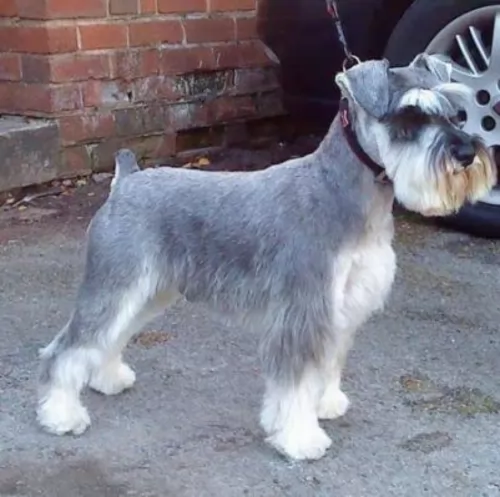 Miniature Schnauzers were first bred in Germany in the 19th century being bred from Affenpinschers and Standard Schnauzers.
Miniature Schnauzers were first bred in Germany in the 19th century being bred from Affenpinschers and Standard Schnauzers.
This dog was always used to control rats on farms, but these days he is more a companion. It is believed that the start of the modern Miniature Schnauzer in the United States was around 1924 when dogs were imported from Germany.
It was in 1933 that the Miniature Schnauzer was recognized by the AKC as a separate breed from the Standard Schnauzer.
 Known also as the South Russian Sheepdog or the Ukranian Shepherd Dog, the South Russian Ovcharka’s history isn’t well established, and there are different stories to its history.
Known also as the South Russian Sheepdog or the Ukranian Shepherd Dog, the South Russian Ovcharka’s history isn’t well established, and there are different stories to its history.
Whatever their history, this large dog is closely related to the wolf and has also been crossed with sight hound dogs. Their numbers have been under threat when their role as herding dog was no longer needed for rural life.
It was in the 1920s however that the breed’s numbers were restored and the UKC officially recognised the South Russian Ovcharka in 1996.
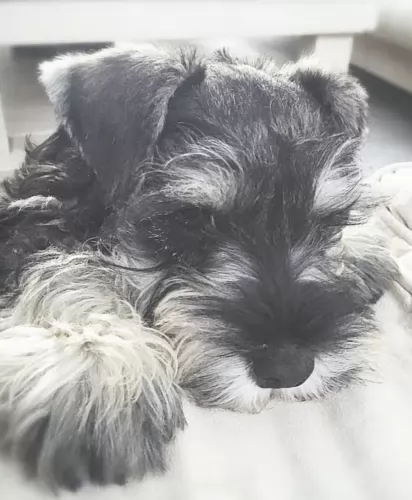 The Miniature Schnauzer is a small dog breed that stands between 30 to 36cm in height and weighs between 5 and 10kg.
The Miniature Schnauzer is a small dog breed that stands between 30 to 36cm in height and weighs between 5 and 10kg.
He has a sturdy body with a dense, wiry coat which most people prefer to have stripped. Because stripping is quite tedious, many of these dog owners prefer to have the coat clipped which actually gives the coat a greyish look to it.
The coat is usually a mix of black and silver. Some people refer to the Miniature Schnauzer as having a salt-and-pepper coat – hairs that are a mix of black and white. The dog has a double coat with the outer coat being wiry and the undercoat being a lot softer.
This is a dog that will need to be groomed frequently to prevent matting. A noticeable feature with these dogs is the rectangular shaped head with alert slanted eyes and bushy eyebrows, mustache and beard. In fact the word ‘Schnauzer’ means beard or muzzle.
The ears have been traditionally cropped but these days they are left and then they tend to be half-erect, half-floppy.
This is a tough little dog, fearless, cheeky, arrogant, alert and also friendly. A draw-card with him is that he is considered as a low-shedder and being hypoallergenic.
They’re very intelligent dogs too and will learn quickly when you give him training and socialization. This is important for a dog like this as he can quickly show you that he is strong willed and independent. Training and socialization makes him much nicer as he becomes more balanced and obedient.
He is full of life and extroverted and you can count on him to join you wherever you are and whatever you’re doing. Whether watching TV, swimming or hiking, he’ll be there and turn every occasion into a festive event. He is a loving, loyal dog, making a splendid pet.
He's protective of his human family and tends to be suspicious of strangers, and this is what makes him such a great watchdog.
 A large, big boned, well muscled herding dog, the South Russian Ovcharka stands at between 62 and 66cm in height and weighs between 46 and 52kg.
A large, big boned, well muscled herding dog, the South Russian Ovcharka stands at between 62 and 66cm in height and weighs between 46 and 52kg.
The dog has a thick, fairly coarse, weather-proof coat that can become long and this coat has always protected them from the harsh Russian winters.
He has small, floppy ears and the tail is medium length and also covered in thick fur.
These dogs need a lot of exercise and if you keep one as a pet he will need a lot of space to run and play. He guards his property too and makes a good watchdog.
He isn’t suited to living in small spaces in the city. He is a dominant, independent and strong willed dog so training and socialization will be important if you don’t want him to be unruly.
With the right kind of training, the South Russian Ovcharka can get along with pets and children in the home. He isn’t aggressive but he has strong guardian characteristics.
The first time dog owner would need to be firm, strong, confident, consistent and kind to handle this strong willed dog.
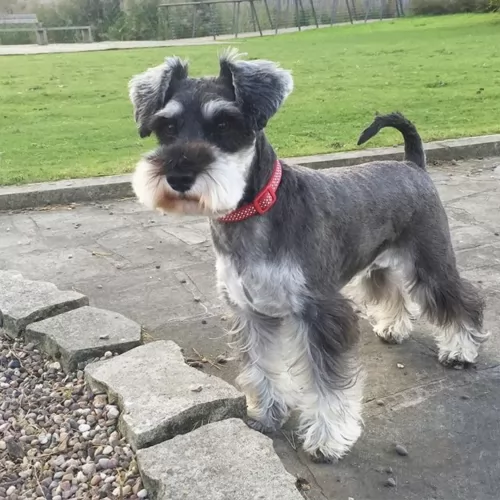 Miniature Schnauzers are such adaptable little dogs, quite happy to make a home with you in the city or in the countryside.
Miniature Schnauzers are such adaptable little dogs, quite happy to make a home with you in the city or in the countryside.
They’re sociable dogs, so just being with his human family wherever they are will suit him well. If he lives in the city however, he will need to have a walk everyday or taken to the park for a run.
He is also a dog that scarcely sheds, so he suits people battling with allergies. With an average life expectancy of 12 to 14 years, if you nurture your Mini Schnauzer and give him the best food and exercise there is, as well as loving him, you’re going to have a loyal and devoted pet.
 The South Russian Ovcharka may well be independent and strong headed but there is nothing that a little bit of training and socialization can’t do.
The South Russian Ovcharka may well be independent and strong headed but there is nothing that a little bit of training and socialization can’t do.
He is intelligent and will pick up some obedience commands easily. He is is dog that will like a strong, firm, consistent owner - someone who likes to include him in all the family activities.
He can get on with children but is better suited to life on a larger property as opposed to living in a small city place. Treat him with firmness and fairness and you’ll get yourself an excellent pet and companion.
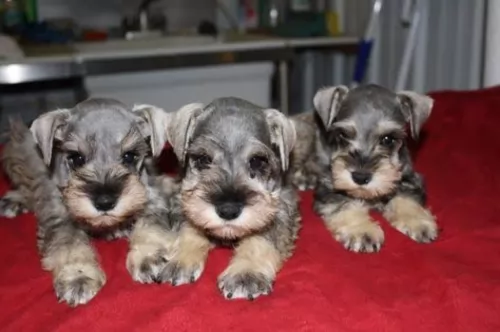 Your Miniature Schnauzer is pretty healthy and he isn’t likely to cost you much in terms of vet fees. There are however some common dog problems that you want to be aware of such as cataracts of the eye and hypothyroidism.
Your Miniature Schnauzer is pretty healthy and he isn’t likely to cost you much in terms of vet fees. There are however some common dog problems that you want to be aware of such as cataracts of the eye and hypothyroidism.
This a a problem in the lens of the eye. The lens should be clear, and when a dog has a cataract, it obscures the vision. The size of the cataract can lead to blindness.
Diabetes in a dog can bring on cataracts as can genetics or damage to the eye from exposure to ultraviolet light. Fortunately, dogs with cataracts can still see. Dogs with old cataracts can have surgery to remove them.
When a dog owner suspects a cataract in their pet’s eye it is best to treat it immediately with anti-inflammatory dog cataract eye drops. Cataracts never go away however without surgery.
The thyroid gland in the neck produces a hormone called thyroxine. It controls metabolism, but with hypothyroidism, enough of the hormone isn’t made. Its a common disease which affects all dog breeds.
Signs of hypothyroidism include hair loss, weight gain, intolerance to cold and a troublesome skin. To have the disease diagnosed, the vet will do a series of blood tests.
 This large breed has a lifespan of 9 to 11 years. Some of the health conditions to which this big dog can succumb are -
This large breed has a lifespan of 9 to 11 years. Some of the health conditions to which this big dog can succumb are -
This is something that affects many dogs, but particularly large dogs. When the hips haven’t formed properly, it can lead to pain, disability and arthritis.Lifestyle changes can help, like making sure your dog doesn’t pick up too much weight. For pain management you will need to get your pet to the vet.
Also known as Gastric Dilatation. The dog’s stomach fills with gas and can twist, and this in itself can be fatal. As soon as you see your pet pacing restlessly and he has a swollen stomach, he will need to get to the vet just as soon as possible.
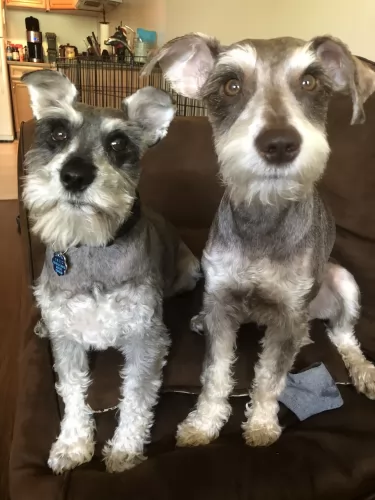 Let’s look at several ways you need to care for your Miniature Schnauzer -
Let’s look at several ways you need to care for your Miniature Schnauzer -
Make sure you have his puppy injections on time. This means knowing which veterinarian you’ll use. Later on if you don’t want to go in for breeding, you will need to have your pet spayed or neutered.
Make sure you have a nice warm, dry spot for your dog to sleep. It can be a cardboard box, or you can buy a dog basket or sleeping platform. Make sure your pet loves it and knows he can retreat to it anytime he wants.
If he goes outside for a few hours, make sure that he has a place to lie in the shade and away from the elements.
Good food promotes good health and longevity. You can feed your pet one of the top quality commercially manufactured foods and give your pet some variety by adding in some boiled chicken, vegetables and brown rice. Some raw meat occasionally can also be excellent for your pet.
 The long coat is certainly going to need a good brush at least twice a week as it can so easily become matted.
The long coat is certainly going to need a good brush at least twice a week as it can so easily become matted.
Because he has floppy ears, you will need to check inside the ears that they aren’t showing signs of redness, indicating the possibility of a ear infection. Check at the same time for ticks and fleas.
This dog is going to need a good deal of exercise to keep him content. He will love a long walk out and about. Robust games will also need to be provided. It’s why he isn’t looked upon as a dog suited to the city. He needs a lot of space and can become frustrated and destructive if his exercise needs aren’t met.
A dog is part of the family and he therefore deserves a good meal too. Good food is beneficial as it means your dog is less likely to get sick.
Like many dog owners, you’ll no doubt appreciate the convenience of commercially manufactured dog foods. You’ll need to choose the best one though because the inferior ones are made up of bad ingredients – fillers that have no goodness whatsoever.
To provide your South Russian Ovcharka with a tasty treat, try and give him some home-made food. Boiled chicken, rice or pasta, sweet potatoes, carrots and spinach are simple and tasty and won’t trouble your dog’s stomach.
Chop some of it up and add a small portion of this into his dry kibble twice a week. Your dog’s wagging tail will tell you how much he loves it.
To avoid skin infections, try to include some raw meat into his diet too when you can. Make sure your dog has a constant supply of fresh, cool water.